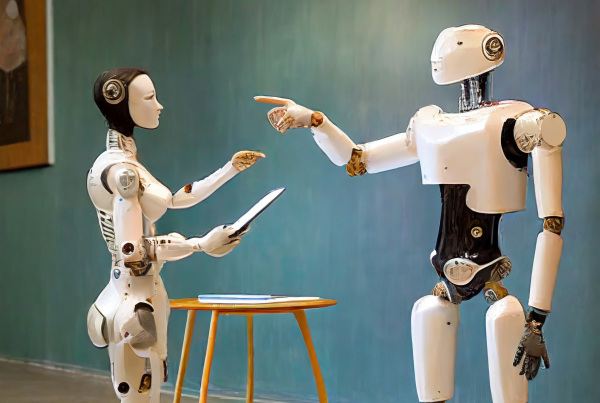Artificial intelligence (AI) is transforming industries at an unprecedented pace, and while it’s creating new opportunities, it’s also raising concerns about job displacement. With its ability to automate tasks, process massive amounts of data, and make decisions faster than humans, AI is poised to impact the workforce significantly. As we approach 2025, specific jobs are at high risk of disappearing or being heavily modified by automation. Here’s a look at the jobs most vulnerable to AI takeover and what this means for the future of work.
1. Customer Service Representatives
Customer service has long been one of the most outsourced and automated sectors, and AI is taking this trend even further. Chatbots, virtual assistants, and automated phone systems can now handle routine inquiries, resolve issues, and provide personalized recommendations without human intervention. As AI continues to evolve, it will increasingly be able to handle more complex customer service tasks, reducing the need for human representatives in industries like retail, telecommunications, and tech support.
While human agents will still be needed for high-level problem-solving or emotional support, many entry-level and routine customer service positions will remain the same by 2025.
2. Data Entry Clerks
Data entry has traditionally been labor-intensive, involving manually inputting and organizing data into systems. AI-powered systems and machine learning models can handle much of this work. Optical character recognition (OCR) and natural language processing (NLP) technologies enable AI to read, interpret, and input data automatically, eliminating the need for human data entry clerks in many industries.
While some data tasks may still require human oversight, most data entry roles will be obsolete by 2025 as AI continues to streamline these processes.
3. Retail Workers
The retail industry has already seen the rise of automation with self-checkout kiosks and automated stocking systems. AI will continue to replace many aspects of traditional retail jobs in the coming years. Automated checkout, inventory management robots, and AI-driven supply chain systems are poised to eliminate the need for human cashiers, shelf stockers, and even store managers in specific settings.
E-commerce platforms like Amazon are also pushing the boundaries of AI in retail with cashier-less stores, where customers use apps and sensors to shop without interacting with a cashier. As these technologies scale, retail workers in physical stores may face significant job displacement.
4. Drivers and Delivery Personnel
Self-driving technology has made significant strides in recent years, with companies like Tesla, Waymo, and Uber testing autonomous vehicles for passenger transport and deliveries. By 2025, autonomous cars are expected to be fully operational in many urban areas, drastically reducing the demand for human drivers.
Truck, delivery, and taxi services are among the most vulnerable to AI disruption. While fully autonomous vehicles still face regulatory and safety challenges, many experts predict that AI-driven vehicles will become mainstream within the next few years, displacing millions of driving-related jobs.
5. Warehouse Workers
AI and robotics are already revolutionizing the logistics and warehousing sectors. Companies like Amazon and Walmart have deployed robots to automate picking, packing, and sorting inventory tasks. These AI-driven robots are faster and more efficient than humans and can also operate 24/7, reducing the need for human workers in warehouses.
By 2025, the demand for warehouse workers will continue to shrink as AI-powered machines take over even more aspects of the supply chain, including inventory management and order fulfillment.
6. Financial Analysts and Advisors
AI is also making a significant impact in the finance industry. Machine learning algorithms are already used to analyze stock market trends, make investment predictions, and offer personalized financial advice. Robo-advisors, which use AI to create customized investment portfolios based on individual preferences and risk tolerances, are becoming increasingly popular.
By 2025, financial analysts and advisors who rely on traditional research and advice methods may find their roles greatly diminished, as AI systems offer faster, more accurate, and cost-effective alternatives.
Preparing for the Future of Work
As AI continues to reshape industries, preparing for the changing job landscape is essential. While some jobs will disappear, new opportunities will emerge, particularly in AI development, machine learning, and data science. Upskilling and reskilling in these areas will be crucial for workers looking to adapt to the evolving economy.
AI is not a force that can be stopped, but with the proper preparation, we can ensure that workers are not left behind in the digital revolution. By embracing new technologies and focusing on jobs requiring human creativity, emotional intelligence, and critical thinking, we can build a future where humans and AI work in harmony.




